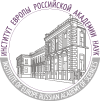In accordance with the requirements of international citation databases, the journal Scientific and Analytical herald of the Institute of Europe of the Russian Academy of Sciences uses the following order of references and references.
BASIC PRINCIPLES
- In-text references are given in the text. According to the model: (Ivanov 2019: 23).
- the list of used literature and sources is given at the end of the article in the form of a combined list of publications in Russian and foreign languages;
- the section "References / References" is compiled without numbering and in alphabetical order;
- bibliographic entry always begins with the author's surname (if possible), then initials;
- the surname is separated from the initials by a comma;
- after the author's surname and initials, the year of publication is put in parentheses. After - a dot;
- If an article contains more than one entry by the same author, then they should be sorted by date;
- The place of publication is shown in front of the publisher's name. Place of publication - city, country;
- Links to electronic resources follow the same rules.
Rules for Russian literature:
- The title of the article/book should be translated into English in square brackets;
- The name of the periodical is given in transliteration. If it has an official English name, then that name should be given;
- The name of publishing houses and organizations of the CIS is given in transliteration.
- The name of the city, the names of conferences, explanatory words, phrases are translated into English.
EXAMPLES
Books:
books with one author:
- Adair, J. (1988). Effective management: How to save time and spend it wisely. London: Pan Books.
- Швейцер, В.Я. (2021). Партийно-политическая система Европейского союза в начале XXI века. М.: ИЕ РАН, 2021. [Schweitzer, V.Ya. (2021). The party and political system of the European Union at the beginning of the XXI century. Moscow: IE RAS. (in Russian).] DOI: 10.15211/report52021_383
books with two or more authors
1. McCarthy, P., Hatcher, C. (1996). Speaking persuasively: Making the most of your presentations. Sydney: Allen and Unwin.
2. Дрыночкин, А.В., Габарта, А.А. (2018). Экономика стран Вишеградской группы. М: МГИМО-Университет. [Drynochkin, A., Habarta, A. (2018). Economy of the Visegrad Group countries. Moscow: MGIMO-University.]
books by the same author, in the same year
1. Napier, A. (1993a). Fatal storm. Sydney: Allen and Unwin.
2. Громыко, А.А. (2017b). О насущном. Европа и современный мир. М.: Нестор-История. [Gromyko, A. About the essential. Europe and the modern world. Moscow: Nestor-Istoriya.]
books with anonymous or unknown authors
1. The University Encyclopedia (1985). London: Roydon.
2. Российские ученые-европеисты (2008). М.: ИЕ РАН. [Russian European studies scholars. Moscow: IE RAS.]
Edited books
books under the general editorship (without authors)
1. Danaher, P. (ed.) (1998). Beyond the ferris wheel. Rockhampton: CQU Press.
2. Белов, В.Б. (отв. ред.) (2020) Германия. 2020. [Belov, V.B. (ed.) (2020). Germany. 2020. (in Russian).] DOI: 10.15211/report12021_37
article in an edited book
1. Nevskaya, N.A. (2021). European Investments Opportunities After COVID-19. In: Osipov, V. (ed.) Post-COVID Economic Revival. Vol. I. Cham: Palgrave Macmillan: 235-247. DOI: 10.1007/978-3-030-83561-3
2. Кузнецов, А.В. (2018). Экономическая мощь Германии как основа лидерства страны в Европе // Пределы лидерства Германии в Европе: сборник статей. Отв. ред. А.В. Кузнецов. М.: ИМЭМО РАН. С. 9-14. [Kuznetsov, A.V. (2018). The economic power of Germany as the basis of the country's leadership in Europe. In: Kuznetsov A.V. (ed.) (2018). The Limits of German leadership in Europe: a collection of articles. Moscow: IMEMO RAS: 9-14. (in Russian).]
Articles in magazines and periodicals:
journal article
1. Bessant, J (2001). The question of public trust and the schooling system. Australian Journal of Education (45): 207-226.
2. Данилов, Д.А. (2021). Саммит НАТО: глобальное будущее после «смерти мозга» // Научноаналитический вестник ИЕ РАН (3): 7-14. [Danilov, D.A. (2021). NATO Summit: a Global Future after Brain Death. Nauchno-analiticheskij vestnik IE RAN 21(3): 7-14. (in Russian).] DOI: 10.15211/vestnikieran32021714
Digital resources
You have to follow the same citation convention as for printed sources, but include elements unique to the Web:
article posted on the Internet resource:
- Aydogan, M. (2021). Turkey’s long involvement in NATO mission in Afghanistan. Anadolu Agency. 19.06.2021. Available at: https://www.aa.com.tr/en/asia-pacific/turkey-s-longinvolvementin-nato-mission-in-afghanistan/2279062 (accessed 19.08.2021).
- Большаков, М. (2021) Премьер-министр Венгрии: «Преклонению колена нет места на стадионах. Венгры преклоняют колено перед Богом, родиной и когда просят руки». Sports.ru. 10.06.2021. [Bolshakov, M. (2021). Prime Minister of Hungary: “There is no place for kneeling in stadiums. Hungarians bow their knees before God, their homeland and when they ask for hands”. Sports.ru. 10.06.2021.] Available at: https://www.sports.ru/football/1097919009-premer-ministrvengrii-prekloneniyu-kolena-net-mesta-na-stadionax-veng.html (accessed 10.07.2021).
official document:
Brussels Summit Communiqué. NATO. 24.06.2021. Available at: https://www.nato.int/cps/en/natohq/news_185000.htm (accessed 25.08.2021).
















